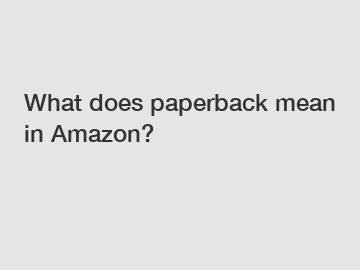What does paperback mean in Amazon?
What does "paperback" mean in Amazon?
2. The Definition of Paperback.
3. Benefits of Paperback Books.

4. Disadvantages of Paperback Books.
5. How to Choose Between Paperback and Hardcover.
6. Frequently Asked Questions about Paperback Books.
7. Conclusion: The Appeal of Paperback Books on Amazon.
What does "paperback" mean in Amazon? If you have ever searched for books on Amazon, you must have come across this term numerous times. But what exactly does it imply? In this article, we will discuss the meaning of "paperback" in the context of Amazon and delve into the advantages and disadvantages of this popular book format.
The Definition of Paperback.
A paperback book refers to a book with a flexible, paper-based cover and generally lighter and more portable than hardcover books. In contrast to hardcovers, paperbacks are bound using glue, making them more affordable and easier to manufacture. The term "paperback" originated in the 19th century when publishers began issuing books with paper covers as a cost-effective alternative to traditional hardcovers.
Benefits of Paperback Books.
1. Affordability: One of the primary advantages of paperback books is their cost-effectiveness. Generally priced lower than hardcovers, paperbacks make reading more accessible to a wider audience. Furthermore, discounted and used copies are readily available on Amazon, making it an affordable option for avid readers.
2. Portability: Paperback books are lightweight and easy to carry, making them ideal companions for travel or everyday commutes. Their flexible covers allow for easier fitting into bags or pockets, without the added bulkiness of hardcovers. Flexibility also means less fear of damaging the book while on the move.
3. Convenience: Paperbacks are particularly convenient for readers who enjoy holding the book with one hand or reading while lying down. The flexibility of the cover allows for easier handling and comfortable reading experiences. Moreover, comfier reading positions are attainable with paperbacks, as they can be bent or folded without causing damage.
Disadvantages of Paperback Books.
1. Durability: While paperback books are lightweight and portable, they are generally less durable than hardcovers. The comparatively flimsy cover and binding make them more prone to wear and tear, especially if carried around regularly or mishandled. If you're looking for a book that will stand the test of time, a hardcover might be a better option.
2. Quality: Paperback books often have thinner and lower-quality paper compared to hardcovers. This can result in increased transparency and fragility of the pages. Additionally, the print quality might be slightly inferior due to the type of paper used. However, it is important to note that this might vary depending on the specific book edition.
3. Limited Availability: While many books are released in both hardcover and paperback editions, it's worth noting that some titles might only be published in one format. This limitation can restrict the choice of readers who prefer one format over the other. Additionally, as new books are typically released in hardback first, readers might need to wait for the paperback version to become available.
How to Choose Between Paperback and Hardcover.
Choosing between paperback and hardcover largely depends on individual preferences, budget, and reading habits. Consider the following factors when making your decision:
1. Cost: If budget is a concern, paperback books are the more economical choice. They are typically priced lower than hardcovers, and you can often find used copies or discounted versions.
2. Mobility: If you are frequently on the go, enjoy reading during a commute, or desire a lightweight option for travel, paperbacks are your ideal choice. Their compact size and flexibility make them easy to carry around.
3. Longevity: If you prefer books that can withstand heavy use or want to build a lasting library, hardcovers are a better option. Their sturdy binding and quality materials ensure their durability over time.
Frequently Asked Questions about Paperback Books.
Q: What is the difference between a paperback and a trade paperback?
A: Trade paperback books are larger in size compared to regular paperbacks. They often have a similar height to hardcovers but a softer cover like paperbacks.
Q: Can I get the same book in both hardcover and paperback editions?
A: Yes, many books are released in both formats. However, not all titles are available in both editions, so it's important to check the product details before making a purchase.
Q: Should I buy a hardcover or wait for the paperback version?
A: This decision depends on personal preference and circumstances. If you don't mind waiting, opting for the paperback version can help you save money. However, if you are eager to read a specific book or prefer the design and durability of hardcover, it might be worth purchasing the hardback edition.
Conclusion: The Appeal of Paperback Books on Amazon.
In conclusion, "paperback" is a term commonly used in the Amazon marketplace to describe books with flexible paper covers. While paperback books have certain disadvantages, such as reduced durability and potentially lower paper quality, their affordability, portability, and convenience continue to attract a large readership. Ultimately, the choice between paperback and hardcover is subjective, driven by personal preferences, reading habits, and budget constraints. Whether you opt for paperback or hardcover, what matters most is the joy of reading and immersing oneself in the world of books.
For more cnprint, cnprint, embossed hardcover bookinformation, please contact us. We will provide professional answers.


